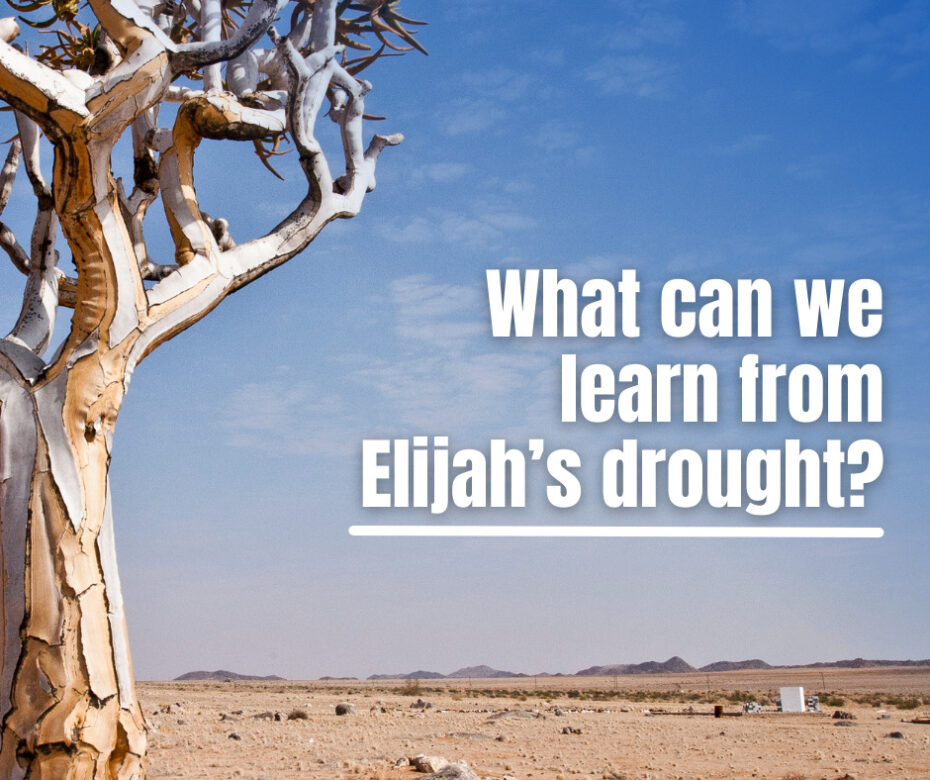In 1 Kings 17, the prophet Elijah suddenly appears in the Nation of Israel. He has some bad news. There is going to be a severe drought that will impact the land. It will last for over three years. In a country dependent upon agriculture, this would be devastating.
In the verses that follow (1 Kgs 17:8ff), we see just how devastating the drought was. A Gentile woman living northwest of Israel was preparing to die. She had a young son who would die with her since there was no more food for them to eat.
A reader might conclude that the drought was entirely a bad thing to happen to the land. Such a conclusion, however, would be wrong.
Elijah announces this drought during the reign of a very evil king named Ahab who, in collusion with his wife Jezebel, had made worship of the idol, Baal, the official religion of the realm. Baal was believed to control the weather, including rain, and was the false god the people depended upon to produce abundant crops and to feed them. The word of the Lord through Elijah was showing the people that God was, in fact, the only One who could provide these blessings. He was also the One who could withhold these blessings if the people rebelled against Him.
The Gentile woman lives in the area that is at the very center of Baal worship; Jezebel, in fact, is from this same region. Elijah comes to the woman and miraculously feeds her and her son. Elijah saves their lives. The message is clear even to this Gentile. Her idol could not save her. The God of Israel could.
The woman is certainly open to what Elijah says and does. When Elijah asks her for something to eat she says, “As the Lord your God lives” (1 Kgs 17:12). She recognizes that the god of her area, Baal, is as good as dead. Baal is impotent to help her. The God of Israel is a different story. Later, when Elijah performs another miracle for her by raising her son from the dead, she says that Elijah is “a man of God, and that the word of the Lord” spoken by him is the truth (v 24).
In other words, the drought was the way in which God revealed Himself to this Gentile woman. We know that this was the will of God because the Lord Jesus refers to this story when He begins His ministry (Luke 4:26).
But the main lesson of the drought was for the Nation of Israel. The sin of Ahab and Jezebel would have catastrophic consequences for the nation. If the people did not turn from their sin of idolatry and all that flowed from that sin, the nation would be taken off into captivity. God was showing them that Baal was a dead, powerless, false god. Through His prophet, God would perform many miracles to show the people that Elijah was speaking the truth, that Elijah’s God was the true God, and that Baal was an imposter. Only at the word of the Lord would the rain return.
The drought was an attempt to get the people to repent. Repentance is a turning from sin. It is not a requirement for receiving eternal salvation; rather, it leads to the avoidance of God’s discipline. God was getting His people’s attention through the difficulties He brought upon them with the drought. He wanted them to repent and to experience His blessings.
There are many parallels with the ministry of Elijah and the earthly ministry of Christ. Christ also came to the Nation of Israel. It was a nation in rebellion against God. It needed to repent. Christ announced to the people how they could be blessed by God: They needed to turn from their sins and to then believe in Him for eternal life. He demonstrated the truth of His words by the miracles He performed. Without a doubt, His ministry was one of grace. This was true even though the nation rejected His message and experienced the discipline of God through the Romans in AD 70.
It is clear that the drought God brought through Elijah was an expression of His grace. He gave the people clear proof that worshiping Baal would bring destruction, but that God was able to bless them. Through the drought, the majesty of the God of Israel was manifested to Gentiles. And some within Israel itself would have responded appropriately to the discipline of God, even if the majority did not.
It is easy to find applications for us today. God uses difficulties in our world to encourage people to seek Him. When believers live carnally, God brings trials to get them to repent. He can even use difficulties in the lives of obedient believers to teach them things they need to know.
Many things in the news today concern us. Our world seems to be falling apart. As believers, we should rest, knowing that God is sovereign. He used a long, severe drought for good and for His purposes. He can use what is happening in today’s world as well.


